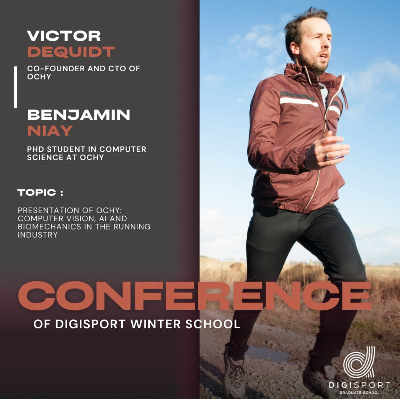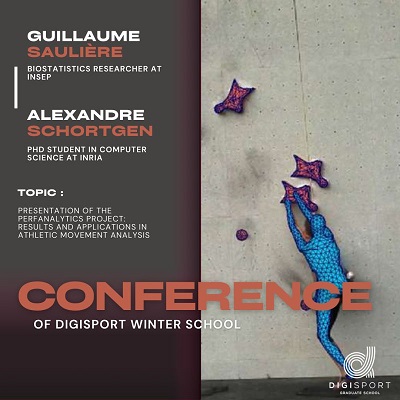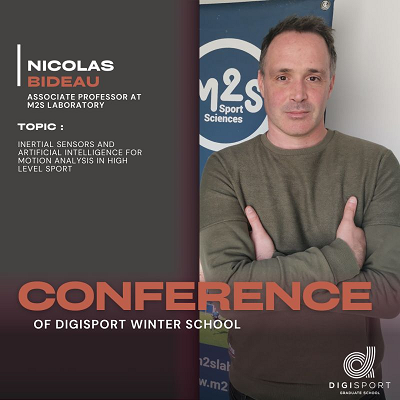
Victor Dequidt, co-founder and CTO of Ochy and Benjamin Niay, PhD in Computer Science will present how Ochy is using computer vision, AI and biomechanics in the running industry.
They will then present the use of their AI system in collecting and interpreting biomechanical data in running, to produce a biomechanical analysis accessible to everyone using smartphone recordings.
 Guillaume Saulière, a biostatistics researcher at INSEP, and Alexandre Schortgen, a PhD student in computer science at INRIA, will present the priority research project PerfAnalytics, funded by the National Research Agency. This presentation will highlight the main results of the project, illustrated with application examples from various Olympic and Paralympic sports.
Guillaume Saulière, a biostatistics researcher at INSEP, and Alexandre Schortgen, a PhD student in computer science at INRIA, will present the priority research project PerfAnalytics, funded by the National Research Agency. This presentation will highlight the main results of the project, illustrated with application examples from various Olympic and Paralympic sports.
In the second part, the markerless motion analysis methods developed by PerfAnalytics will be showcased through an athletic profiling case study. A video-based estimation of mechanical power produced during counter movement jumps will be compared with results measured by force platforms

Postdoctoral researcher in bioengineering at Stanford Universityand co-developer of OpenCap.ai, will lead a conference at the DIGISPORT 2024 Winter School. He will talk about OpenCap, an open-source software that provides its users with instant detailed analysis of their movement and posture from video data, without requiring specific skills or advanced equipment.
In this talk, he will go over the methods and validation studies he conducted, and present a series of applications related to sports performance, injury prevention, and rehabilitation. He will highlight strengths and limitations of the system and share thoughts for future directions.

Steefi Colyer, Senior Lecturer (Associate Professor) in Biomechanics from the University of Bath, will present her research applying markerless motion capture to unobtrusively obtain performance- and/or injury-relevant information in various sports including tennis, badminton and bob-skeleton.
This talk will outline the process of extracting motion from images, highlighting both the utility and the limitations of markerless approaches that must be considered before such technologies are adopted. In relation to different applied sport research problems, this talk will present markerless solutions to enable detailed biomechanical analyses to be conducted outside of the laboratory in normal training and competition settings.

Silvia Fantozzi, Associate Professor at the University of Bologna, will present the use of inertial sensors for the biomechanic analysis of swimming from the laboratory validation to the in-field use with athlete during training session. Different solutions and analysis will be described: from single to multiple sensors, from temporal phases to joint kinematic analysis. The recent development of wearable inertial sensors allows quantitative evaluation of swimming technique for improving performance and injury prevention.
This work will focus on several major challenges: sensor features and locations, type of kinematic analysis, validation in laboratory and in swimming pool. These solutions aim to provide quantitative feedback to coaches and athletes for improving performance and reduce risk of injury.

DIGISPORT PhD student, he will be present at our Winter School to lead a workshop on his thesis topic conducted in a real situation on the athletics track.
The use of inertial measurement units (IMUs) and markerless analysis technologies represents a significant advance in the biomechanical analysis of sport, particularly for complex disciplines such as pole vaulting in training and competition conditions. The aim of this workshop is to propose a toolbox for biomechanical analysis applied to pole vaulting, based on data obtained by inertial measurement units (IMUs) and markerless video capture.

From the 'Movement Sport Health laboratory' (M2S laboratory), he will present inertial sensors and artificial intelligence for motion analysis in high level sport. Biomechanical analysis plays a key role in optimizing sports performance by enabling regular and precise motion capture in real training conditions. Thanks to technological advancements, the development of wearable sensors has made a significant leap forward, allowing for more detailed and relevant analysis of athletes' movements.
Today, artificial intelligence (AI) is revolutionizing the use of these sensors by providing instant feedback aligned with the demands of high-level sports. In preparation for the 2024 Olympic Games, he has conducted innovative research combining AI and inertial measurement units (IMUs) to evaluate and optimize athletes' movements.
This work has focused on several major challenges: sensor selection and acceptability among elite athletes, sensor-to-segment calibration, and the automation of analysis processes. These solutions aim to provide continuous assessments during training and competition, with the ultimate goal of improving performance.

DIGISPORT PhD student, he will be present at our Winter School to lead a workshop on his thesis topic. Working closely with French swimmers during their daily training sessions, competitions, and the Olympic Games, his aim is to provide scientific support to their performance and race strategies.
In both pool and open water settings, the use of data from inertial measurement units (IMU) offers an interesting perspective for performance monitoring. The goal of this workshop is to propose a biomechanical monitoring toolbox for swimming, easily usable in real training and competition conditions with high-level swimmers.










